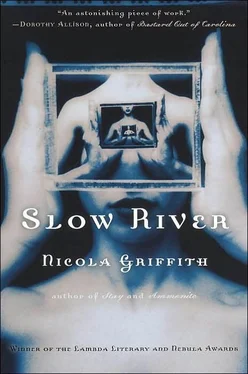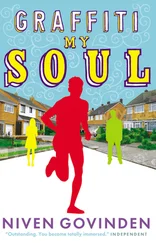“Where are they?”
“There aren’t any. Not in these rooms.” He leads her through to the south side of the house. The change is subtle but definite. The curves of polished wood become more angular, the ceilings brighter, the air more brisk. Huge windows open to a long, long lawn with an intricate, tiled area at the far end. “I tried to disguise it a little.” Lore looks more closely at the lawn, at the tiles, and notices the discreet gray stubs of sensors and sound controls. A copter pad. “When we’re in a hurry, we can fly out.”
Neither of them mentions Lore’s mother.
For the first few months, the house on Ratnapida seems to be doing the job Oster intends. He always makes sure he is at the house a few days before Lore arrives at the end of the school term from Auckland. Sometimes Uncle Willem and his husband Marley are there; sometimes they can only fly in for a day or two. Tok, now a tall, serious fourteen-year-old, comes home from his school in Amsterdam, and Greta flies in from the field. Stella, who seems more like seventeen than fourteen, is there at odd times; sometimes she is sent home from school in disgrace in the middle of term, sometimes she spends the holidays with friends. Her hair is always a different color and her accent changes depending upon fashion.
Lore sees more of her mother than ever before. Perhaps under pressure from Oster, perhaps due to some last vestige of maternal feeling, Katerine makes sure that if she is not already there when Lore arrives, she turns up within a day or two. And Lore, nearly eleven, is allowed to stay up long after dinner, sipping water while the others drink coffee and wine, talking of projects, and work, and new techniques. Her eyes glaze with fatigue long before the talk winds down, and more than once she wakes up in bed and knows that her father has carried her there after she has fallen asleep at the table. But every night she struggles to stay awake, to listen to her family talk, afraid that if she falls asleep she will miss the rare and wonderful feeling that her mother, her father, her stepsister and twins and uncles all love the same thing. For a while she can believe that there is nothing wrong, that she is safe and loved and protected by a family that is whole.
One night, after dessert is just a trace of cream in her glass and the wine is gone and even Tok seems glazed and heavy-eyed, Willem pauses in the middle of filling his coffee cup and looks directly at Lore. “You’re almost eleven.”
Lore is startled, unused to being noticed in the evening. “Day after tomorrow.”
“And I haven’t got you a present yet. Is there anything special you want?”
I want to be grown-up and then I’ll be safe. Safe from what, exactly, she does not know. That confuses her, so she seizes on the symbol of adulthood closest to hand. “I want some coffee.”
Willem turns to Katerine and raises an eyebrow. “Not very ambitious.”
Even at ten, Lore knows when she is being patronized, and one of her father’s favorite sayings pops into her head. “Sometimes the little things are harder to achieve than lofty goals.”
Marley bursts out laughing. “Give her the coffee and just be thankful she didn’t ask for brandy.”
Lore glances at her mother, who is smiling at Marley, and at Oster, who is smiling also, but shaking his head. “Sorry, little one,” he says, “I have a special surprise for you tomorrow for which you need to be up bright and early.”
This is fine with Lore, who is not entirely sure she wants the coffee anyway, but before she can speak, her mother says lightly, “Oh, let the child have some coffee, Oster. Even if it keeps her up half the night, she’ll be game for whatever you have planned at the crack of dawn. She takes after me in that respect. The more she does, the more she can do.”
There is a silence at the table and from that silence Lore understands that she is the chosen battleground of her parents, that whatever she does, however hard she tries, one of them will feel betrayed. But she is not even eleven, and she cannot help but try. So she drinks the coffee, and gets up the next day before dawn to go fish with Oster. The night of her birthday she is included for the first time in her mother’s and Greta’s discussion on a reclamation project in Longzhou; she swims the following day with Oster and Tok.
She never complains and never says she is not interested when Katerine scribbles some catalytic reaction equation on a napkin, or Oster suggests they go look for some tree frogs, but by the end of the holiday, for the first time she is glad to get back to school.
At school, the principal, Mr. Achwabe, makes a comment about the fact that she has lost weight, but she just smiles and determines privately to eat more. In the evenings she reads the case studies her mother sends over the net, and talks to her father about the new species of carp he plans to introduce at Ratnapida before she comes home again.
The time she spends with her friends is almost desperate. She wants to shout to them, Help me! Make them stop, but she does not know how. They are her parents. They love her. She loves them.
As I walked back to the flat with my sack of flower bulbs, I wondered why autumn sunshine hurt the eyes more than sun in spring or summer. Probably something to do with refraction, with the fact that the October sky was a hard, arcing blue and the air was drier than a good gin. Whatever the reason, the slanting eleven-in-the-morning sunshine was smeared gaudily all over the remains of the night frost on rooftiles and guttering, bouncing off the front windows of passenger slides, even reflecting sharply from the lenses of one shopper’s ski glasses. Everyone was wearing bright colors, their cheeks red and eyes sparkling. I doubted they were as cheerful as they looked.
Despite my hangover, I did feel cheerful, and it was somehow related to last night, my time on the roof. I felt different. Nothing miraculous… more as though something tangled up inside me had begun to resolve itself.
My first thoughts this morning when I woke had not been about how I had nearly fallen to my death, or the various diseases and corruptions of a city, but of the planters. Of how I had painstakingly built them, carried them onto the roof, filled them with good, black dirt. Of how they were empty. That, I had thought as I drank hot tea and got dressed, is something I can fix.
And I felt absurdly pleased with the bulbs I had selected, all locally grown: crocuses and tulips, snowdrops and marigolds, iris and verbena and salvia. Rich, bright colors that would last from the end of January up until midsummer. Maybe the scents and colors would bring bees. I tried to imagine lying on the sun-warmed tiles, smelling flowers, listening to the hum of bees, but I realized I was also hearing imaginary fountains plashing softly and the sough of wind in trees, and under all those the bone-deep vibration of sea against rock: Ratnapida.
I had to stop in the middle of the street for a man with three children who was trying to get on a slide. One of the children was refusing to budge and the man—the father, I assumed—was forced to drag him, wailing. The father shot me an embarrassed smile; I nodded as though I understood he had no other choice, but the truth was, I didn’t know. Had Oster ever taken us three—Tok and Stella and me—out by himself? Even if he had, and even if one of us had had the bad manners to pull a tantrum, the family car would not have been far away to whisk us all off to luxurious privacy. I started walking again. One of these days I would be able to see flowers without thinking of family, or Ratnapida, its grass and fountains and low trees.
Maybe a tree wouldn’t be a bad idea. A sapling wouldn’t need too big a planter to start with, and I could get something that blossomed in spring: apple, maybe, or pear. But the wood, and the dirt, and the tree itself would all cost, and the money I took when I left Spanner was running low. I crossed the road on the ceramic safeway opposite my building, trying to work out how much I would get paid at the end of the week and, if I budgeted properly, whether or not I would have enough extra for a tree.
Читать дальше












